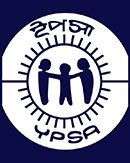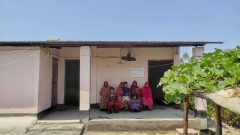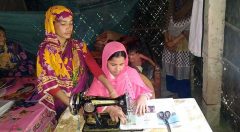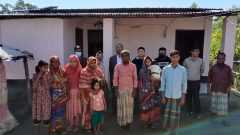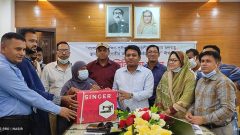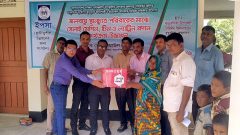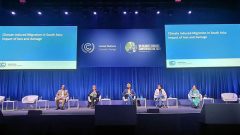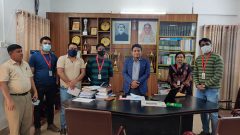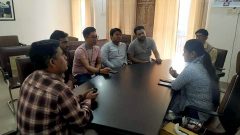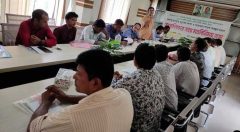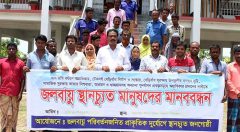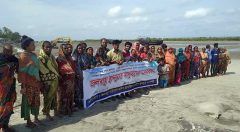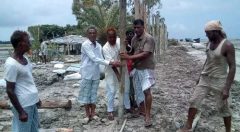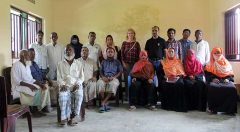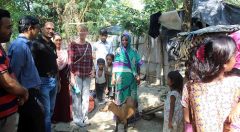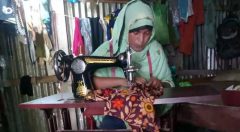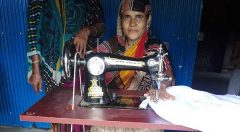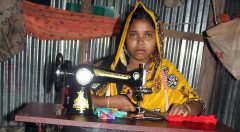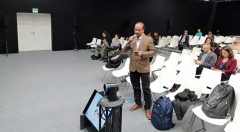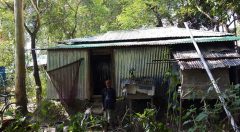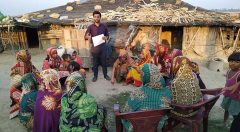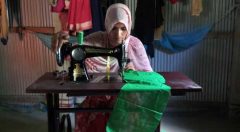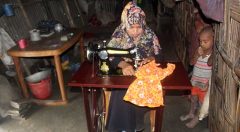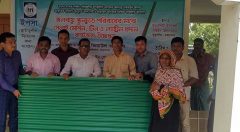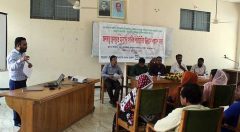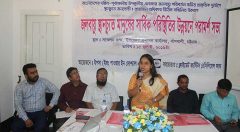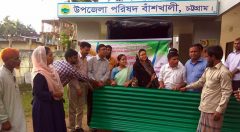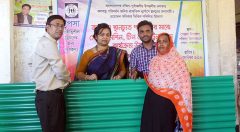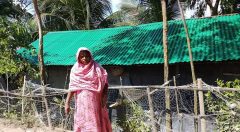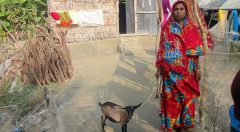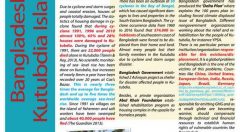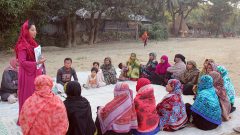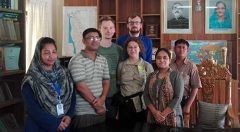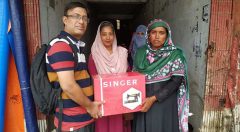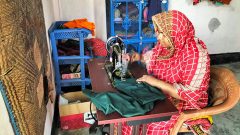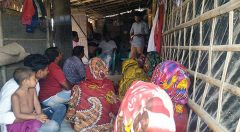Project Title: Addressing the rights and needs of climate forced displaced people in South-Eastern Coast of Bangladesh
Timeline of the Project: November, 2019 to April, 2024
Background
A recent World Bank report estimated that climate change could displace 216 million people across six world regions to move within their countries by 2050, where 40 million is in South-Asia. According to the IDMC report, 4.4 million people were displaced in 2020 in Bangladesh due to disaster events, which is 15% of total disaster displacement in 2020. Displacement and migration happen when mitigation and adaptation measures are failures, which are the consequences of loss and damage. Among the 64 districts in Bangladesh, 26 coastal and mainland districts are already producing climate displacement. Therefore, Bangladesh will have to face the challenge of mass displacement; both external and internal, due to climate change as the country is not yet adequately prepared in providing permanent rights-based solutions through relocation of such a large number of climate displaced people.
As per the mandate of the Paris Agreement for loss and damage, a task force on displacement was formed to develop recommendations for integrated approaches to avert, minimize and address displacement related to the adverse impacts of climate change. In the Glasgow Climate Pact of COP26, it urges developed country Parties, the operating entities of the Financial Mechanism, United Nations entities and intergovernmental organizations, and other bilateral and multilateral institutions, including non-governmental organizations and private sources, to provide enhanced and additional support for activities addressing loss and damage associated with the adverse effects of climate change.
During the YPSA’s survey in the South-Eastern Coast of Bangladesh, it is found that still there are around 15,000 people (those who have no lands) living in the temporary settings (roadside, embankment side) after being displaced due to climate change-related hazards. The survey also found 70% of displaced households experienced displacement two times and more; 50% of displaced households were forced to change their occupation; 95% of families use unhygienic poor condition of latrine which leading to different diseases; 68% of people want to relocate within the same union (own territory) and displaced people deprived of basic needs and rights. Even they are not aware of their rights and from where they can get the benefit.
From the long working experiences with the climate forced displaced people, YPSA realizes that it is important to address the basic needs of thousands of climate forced displaced people who are living in the temporary settings side by side with the planned relocation of selected households. Hence this project is based on both requirements of displaced people such as addressing the basic needs of displaced people considering their vulnerability as well as making them aware to claim their rights through various interventions and finally planned relocation of people who are willing to move along with the local and national level advocacy with the relevant authorities for rights-based solutions to this problem. They need to be mobilized and built capacity so that they can claim their rights and negotiate for their needs. Relevant stakeholders will be involved through different campaigns for acknowledging the facts and playing a positive role in favor of displaced people.
Overall Objective
To fulfill the rights and needs of climate forced displaced people living in the vulnerable condition in the South-Eastern Coast of Bangladesh.
Specific Objective
- To build the capacity of climate forced displaced people and community youths for ensuring the rights of climate forced displaced people and their livelihood security.
- To do advocacy with the relevant stakeholders for rights-based solutions to the climate forced displacement.
- To ensure shelter with basic facilities for displaced people in the safer location.
Project Location
The project will cover two coastal upazilas (sub-districts) namely Banskhali of Chattogram district and Kutubdia Island of Cox’s Bazaar district.
Target People
- The project mobilizing approximately 10,000 climate forced displaced households for raising awareness and build capacity to claim their rights;
- The project mobilizing and building the capacity of 150 youths at the community level to further mobilize people for positive climate actions and rights of climate forced displaced people;
- The project promoting the alternative livelihood of 100 most vulnerable climate forced displaced households (living in the temporary setting after displacement) to be adaptive to changing situations in the two sub-districts (Banskhali and Kutubdia).
- The project ensuring safer shelter (two bedrooms with one corridor in brick structures) including alternative livelihood and other basic facilities for climate forced displaced households through planned relocation.
- The project directly working with targeted relevant stakeholders as part of advocacy for playing their positive role towards the rights and needs of displaced people.
Achievement of the Project
- The project relocated 8 climate displaced households in the mobilizing approximately 10,000 climate forced displaced households for raising awareness and build capacity to claim their rights;
- Formed 30 community team in the working area with the participation of local people and climate displaced communities and provide the leadership training to the community team member for social mobilization
- Organized 100 Courtyard meeting for the climate displaced communities for buildup their awareness on the rights and needs of climate forced displaced people
- Community people organized 16 community engagement events like human chain, community dialogue, rally, human chain and memorandum letter submitted to the relevant stakeholders for claiming their rights as fulfil their demands as citizens
- Provide tailoring training to 20 women as skill development training and input support and swing machine for alternative livelihood of displaced households
- Organzied 8 consultation workshop with different stakeholders at the union and upazilla level where Upazila Parishad Administration positively play their role for social development program for climate displaced communities
- 2 National level round table discussion meeting held in Dhaka and Chittagong with relevant stakeholders for the rights based solution to the climate displacement through sharing lesson learning from ground zero
- Organize meeting (3 meetings) between relocated families and host community to ensure social cohesion and harmony
- Involve media for news and articles on good practices and vulnerabilities of displaced people to draw the attention of policy maker
- Installation of 5 deep tubewells in the remote areas which resolved the drinking water crisis for at least 400 climates displaced people.
- Set up 20 hygiene sanitatry latrine for climate displaced households which now help them for familiar of hygienic behavior and reduce water borne disease in the respective areas
- Purchased the 4 lands from land owners of Banskhali and Kutubdia upazila and relocated the 8 climate displaced households as community based relocation program after the land development and house construction completed with the ensuring drinking water support and solar system/electric connection facilities.
Future Plan of Activities
Objective/Strategy-1: To build the capacity of climate forced displaced people and community youths for ensuring the rights of climate forced displaced people and their livelihood security
- Courtyard meeting (100) for general awareness and resilience building
- Regular meeting with community team of the displaced people for social mobilization
- Community engagement events (12) by climate displaced people as part for claiming the rights such as rally, human chain, letter writing, signature campaign, demonstration, press conference etc.
- Forming 10 Youth Forums on Climate Action in the working area (15 youth in one forum)
- Provide 2 days-long Training to Youth-Forum on leadership and Climate Action
- Youth best idea competition on Climate Action followed by awarding to best Idea
- Provide need based skill development training on alternative livelihood of displaced households (40 persons) living in the temporary settings after displacement such as homestead gardening, nursery, sewing, handicraft, small business, goat rearing, cow rearing, beef fattening etc.
- Provide need based skill development training on alternative livelihood to relocated households (8 persons).
- Startup capital support for small business/IGA after skills training to displaced households (40) living in the temporary settings after displacement and relocated households (8)
Objective/Strategy-2: To do advocacy with the relevant stakeholders for rights-based solutions to the climate forced displacement
- Four Consultation workshops (120 participants) with different stakeholders at the Upazilla level
- One to one dialogue (20 representatives) with the Local Government officials and Elected Representatives to ensure services for displaced people
- National level round table discussion (1 round table) with relevant stakeholders for the rights based solution to the climate displacement through sharing lesson learning from ground zero
- Provide two orientation to the local Journalists (40 participants) for writing news and articles on good practices and vulnerabilities of displaced people to draw the attention of duty bearer and policy maker
Objective/Strategy-3: To ensure shelter with basic facilities for displaced people in the safer location
- Selection of displaced households (8) for planned relocation
- Potential land selection, land development involving community team
- House and latrine construction, tube-well installation and solar system/electric connection
- Finally hand over the house with land title to displaced households (8)
- Organize meeting (2 meetings) between relocated families and host community to ensure social cohesion and harmony.
Expected Result
- The climate forced displaced households are aware to cope with the situation.
- The climate forced displaced households are aware of their rights and known to the existing GO/NGOs services for them.
- Relevant stakeholders are playing a positive role toward the rights and needs of displaced people
- Income of climate forced displaced households (particularly women) increased through alternative livelihood options.
- The climate forced displaced households (with a special focus on women-headed families) living in safer places with dignity and basic facilities.
Project Narrative Report [Grant No: CLJI-YOU32-NVF-009690-2019-12-01]
Reporting period:
May 01, 2023-April 30,2024
Project Narrative Report [Grant No: CLJI-YOU32-NVF-009690-2019-12-01]
Reporting period:
December 01, 2020-April 30, 2022.
Interim Project Narrative Report
[Grant No: CLJI-YOU32-NVF-009690-2019-12-01]
Reporting period: December 01, 2019-November 30, 2020.
